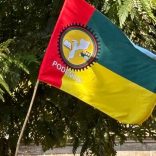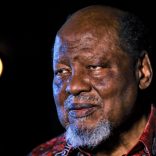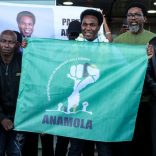EUMAM MOZ receives visit of Swedish Delegation
Poverty results from development model, claims top writer – AIM

Folha de Maputo (File photo)
Poverty in today’s Mozambique is a product of the development model the country has followed, accuses one of Mozambique’s best-known writers, Luis Bernardo Honwana, in an interview published in Friday’s issue of the independent weekly “Savana”.
The interview coincides with the launch of Honwana’s second book, “A Velha Casa de Madeira e Zinco” (“The Old House of Timber and Zinc”). Honwana shot to fame with his first book, “Nos Matamos o Cao Tinhoso” (“We Killed Mangy Dog”), a collection of fictional short stories, published in 1964, and soon established as a classic of Mozambican and African literature.
It was over 50 years before the second book appeared, this time a series of analyses and reflections, largely on cultural themes.
Honwana was not idle in the intervening period. His support for the liberation struggle brought him to the attention to the Portuguese secret police, the PIDE, and he was thrown into a colonial jail for three years. After independence in 1975, he became director of the office of the country’s first President, Samora Machel, and later Minister of Culture.
Honwana rarely gives interviews, and his words to “Savana” will make uncomfortable reading for some. He said it was not only “external factors” that had made it impossible to carry out the promise of independence, “but also our own incapacity to make better use of the opportunities we have around us”.
“Yes, there was the war”, he said, referring to the Rhodesian and South African attacks on Mozambique, “but the 42 years since independence are enough time for all the negative factors to have a lesser weight. We could have done much more than was done, despite the enormous difficulties”.
The country’s development model, said Honwana “is insufficient, it has gaps, it’s bad. We have to find another model, one that does not produce inequalities, that does not produce misery – a model that is capable of producing a more harmonious development”.
“Poverty”, he accused, “is a product of this model. Poverty is produced by this model of development. Extreme poverty, extreme inequalities are inherent to this model”.
“So this model is not convenient for us”, he declared, “it’s not the model we should continue to use, if we want more harmonious development. It is systemic, in the sense that it’s not something that happened by chance. It’s not accidental, it’s a part and a result of the way in which this model functions”.
Honwana made it clear that he is not opposed to the existence of wealth and of rich people “but a possibility must be found for this wealth not to imply the opposite, so that where there is extreme wealth there must also be extreme poverty. But we have not generated a process of social welfare capable of ensuring a better distribution of the wealth that is produced”.
Access to opportunity is not equitable, Honwana argued. “There is a system which ensures that opportunities are only accessible to part of the population. This is not just, this is not a just society. Opportunities must exist for all”.
“Normally, states accept as one of their duties the extension of opportunities to the greatest possible number of citizens”, he continued. “Even in states of a capitalist orientation, such as ours, where people and companies pursue profit, the state has a duty to find ways, through taxes or other means, of channeling some of the wealth produced so that it becomes an opportunity for other, unprivileged parts of society”.
The State was unjust, Honwana accused, because “it is not capable of extending these opportunities to the greatest number of citizens. On the contrary, they are confined to an increasingly narrow minority”.
Honwana believed that one of the causes of the recurrent eruptions of violence in Mozambique “has to do with inequalities, with the incorrect and unacceptable distribution of opportunities and goods. On the one hand, there are groups that are completely destitute, and on the other there are groups that are protected and enjoy access to paths of wealth”.
The war in Mozambique was not started by Mozambicans, he said, but the reasons it has never definitively finished “have to do with the way in which Mozambican live. There are factors which those who are opposed to the ruling party make use of. These factors exist and are objective, and in building peace, we cannot ignore them”.













Leave a Reply
Be the First to Comment!
You must be logged in to post a comment.
You must be logged in to post a comment.